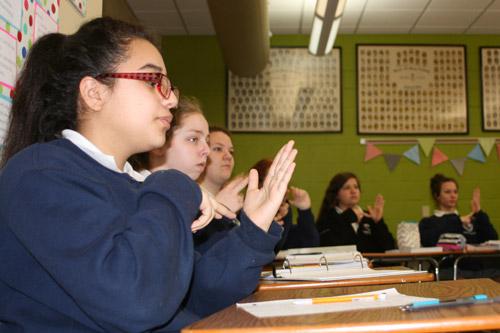

While “hola,” “bonjour” and “salve” echo through the Spanish, French and Latin classes at Mount St. Mary Academy, one language course is full of energy without making a sound.
This year, MSM is offering a semester-long American Sign Language course for students to have better outreach to the local deaf community and as an option for students with learning differences to learn an additional language more easily.
“One of our Mercy values is the dignity of all people,” said principal Angie Collins. “So for us it’s a way to … have a cultural experience and recognize the worth of all people and maybe to bridge that gap between the speaking and hearing-impaired community.”
Throughout the past two years, MSM has been looking into starting an ASL course after the relationship the school has had with the Arkansas School for the Deaf as part of its Junior Service program, where 11th graders volunteer in different community areas. Because students expressed an interest in communicating with deaf students, the school “decided to bite the bullet and go for it,” Collins said, despite the struggle of finding an instructor.
ASL teacher Sandy Boultinghouse, who retired teaching chemistry and coaching for the academy and in North Little Rock, found a newfound love for sign language doing missionary work in Kenya.
“When I went back to Kenya, my heart was really for the deaf community there,” she said.
In 2012, she taught science at the Arkansas School for the Deaf, which was always “on my bucket list” to do.
She agreed to come back to MSM this semester before her granddaughter is born, she said.
“I’ve learned for so long the deaf were suppressed and there shouldn’t be that,” Boultinghouse said. “We have a large deaf community right at our disposal and the language is beautiful and the people are beautiful, and we can learn from them as well as they can learn from us.”
The two classes have 32 students and while it is offered as an elective, it is a certified language allowing students with learning differences like dyslexia to take the course as their foreign language credit.
“They gravitate towards this because it is a visual language,” Boultinghouse said, adding that while those with learning differences may “still struggle with memorization and retaining things, I believe they enjoy (ASL) because they do understand it. I think the key there is they’re working with people in the community.”
Rather than merely signing, students are required to go to certain deaf community events, including the deaf school’s fundraiser Silent Sunday Nov. 8. Boultinghouse often brings in deaf visitors to her class or to lunch hours called “silent soups.” Each class, she sends two or three students to volunteer with elementary students at the School for the Deaf.
“I think immersion in the community teaches them a lot more than I could in just a class period,” Boultinghouse said.
For senior Ashley Flores, taking the course has allowed her to communicate with friends she made at the school last year as part of the Junior Service program.
“I go there a lot, I really love it. It’s like another family to me,” Flores, a member of St. Jude Church in Jacksonville, said of the School for the Deaf. “The day I went to the deaf school this year they were actually introducing themselves to the parents and that’s what we’re learning. I was so happy because I could say, ‘Hi, my name is’ and this is what I do.”
Flores said being able to learn the foundation of ASL will help in college as she studies psychology or speech pathology.
“There’s such a low percentage of parents who sign with a deaf child, and I would really like to be more involved with the family part to help the family stay together,” Flores said. “I met several children that didn’t know sign because they never communicated with their parents, the only communication they had was at the school … They had no language. So I’d like to be more involved in the therapy with deaf families.”
Collins said the school is talking with the University of Arkansas in Little Rock about allowing the Mount’s course to be a concurrent credit.
“They wouldn’t necessarily get credit, but they could test into a higher level (course),” Collins said. “They’ve got an amazing sign language program over here at UALR.”
While some students thought the class would be “easy,” Boultinghouse said they now realize it’s still learning a new language, which makes it challenging.
“They really have to focus, it’s exhausting,” Boultinghouse said. “The way you relate, the creativity, the non-manual signs that are expressive; they’re having to think beyond the box.”
Flores said it was hard at first.
“I like describing things and the facial expressions you put into it,” Flores said. “I thought I’d look funny and I really didn’t want to do it, but at the deaf school it really was important.”
Collins said the school has a few options for new instructors and wants to expand the program in the future.
“We really want to grow it next year. I can see this being a full-time position for somebody,” Collins said. “I can see us really embracing this as a part of our culture as well.”
Please read our Comments Policy before posting.
Article comments powered by Disqus Catholic communities preparing for total solar eclipse
Catholic communities preparing for total solar eclipse
 Papineau steps back after 20 years in parochial league
Papineau steps back after 20 years in parochial league
 High school girls crochet breast prostheses for CARTI
High school girls crochet breast prostheses for CARTI
 2023 Year in Review: Community, teamwork prove pivotal
2023 Year in Review: Community, teamwork prove pivotal
 Catholic school careers lead teachers, staff into faith
Catholic school careers lead teachers, staff into faith
 Winning directory photo honors Our Lady of Guadalupe
Winning directory photo honors Our Lady of Guadalupe
 St. Paul says: How does the Bible define love?
St. Paul says: How does the Bible define love?
 6 steps to getting married in Diocese of Little Rock
6 steps to getting married in Diocese of Little Rock
 Most frequently asked questions on Catholic marriage
Most frequently asked questions on Catholic marriage
 St. Joseph a model of solidarity with immigrants
St. Joseph a model of solidarity with immigrants
 Two gifts after Jesus’ death: Virgin Mary and Eucharist
Two gifts after Jesus’ death: Virgin Mary and Eucharist
 Why we have an altar, and not just a communion table
Why we have an altar, and not just a communion table
 Pope: Wars should be resolved through nonviolence
Pope: Wars should be resolved through nonviolence
 Living relationship with Jesus Christ in the Eucharist
Living relationship with Jesus Christ in the Eucharist